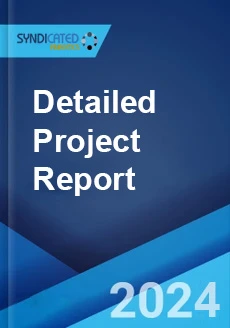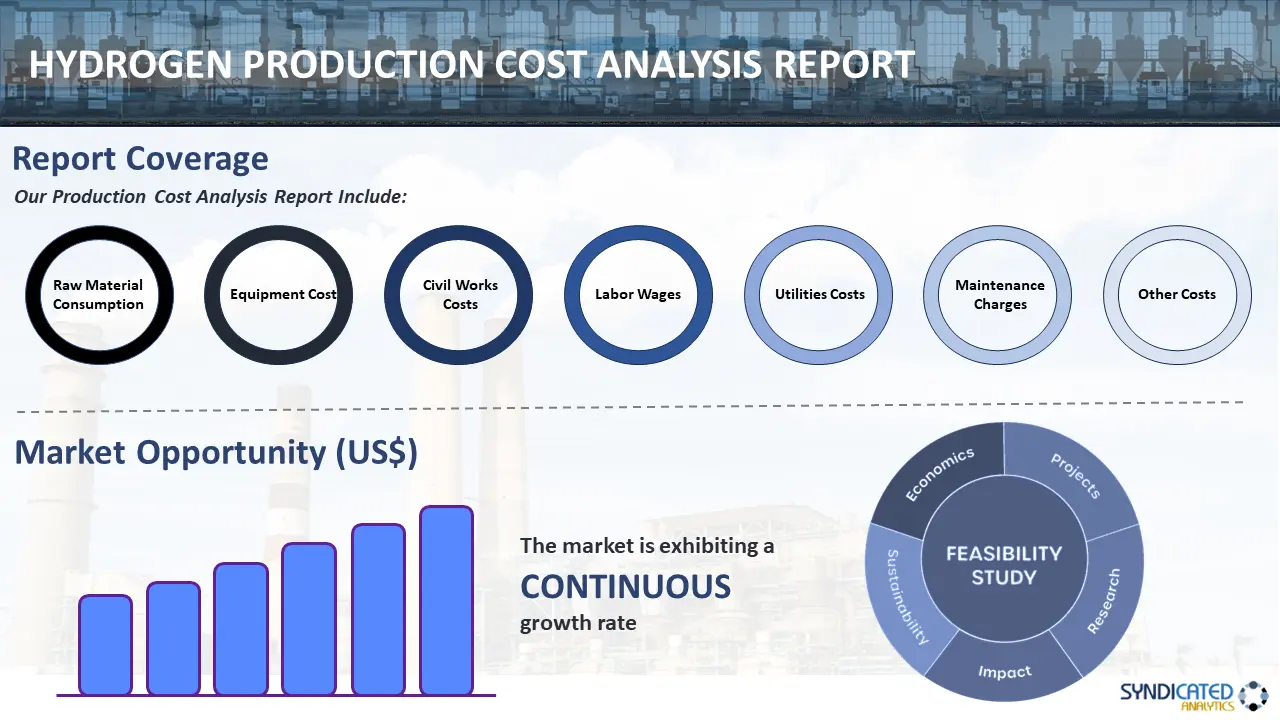
Hydrogen Production Cost Analysis Report 2025 Edition: Industry Trends, Capital Investment, Price Trends, Manufacturing Process, Raw Materials Requirement, Operating Cost, and Revenue Statistics
Report Overview
The report by Syndicated Analytics, titled “Hydrogen Production Cost Analysis Report 2025 Edition: Industry Trends, Capital Investment, Price Trend, Manufacturing Process, Raw Materials Requirement, Operating Cost, and Revenue Statistics,” presents an exhaustive analysis of both the operational expenses and revenue projections for setting up a hydrogen manufacturing facility. Resulting from thorough primary and secondary research efforts, this document offers an in-depth exploration of market dynamics and the effects of the COVID-19 pandemic at both global and regional scales. The study meticulously examines price fluctuations, the balance of mass against required raw materials, and the critical unit operations essential to the hydrogen production process. A detailed assessment of capital expenditures is provided, encompassing the breakdown of expenses related to raw materials, utilities, labor, packaging, transport, land acquisition, construction, and equipment. Additionally, the report forecasts profit margins and suggests strategies for setting optimal product prices. For those considering entering the hydrogen market or current stakeholders, this report serves as a vital tool.

Hydrogen Market Overview:
The market for hydrogen is primarily driven by the rising demand for this clean, adaptable energy source, which could potentially decarbonize several industries and sectors, including power generation, transportation, and industrial. Hydrogen is seen as a crucial component of the low-carbon energy systems that nations are aiming to adopt in order to fulfill climate commitments. Additionally, as green hydrogen has no carbon impact and is made by electrolysis with renewable energy sources, including solar and wind power, it is becoming increasingly popular, which is further augmenting the expansion of the market. For instance, the Chinese government released the country's first-ever long-term plan for hydrogen. The program is focused on a phased approach to developing a domestic hydrogen industry and mastering technologies and manufacturing capabilities.
Moreover, Air Products and VPI (a power generator company) signed a joint development agreement for driving the 'Humber Hydrogen Hub' or 'H3', which seeks to build an 800 MW low-carbon hydrogen production facility in Immingham, United Kingdom.
Hydrogen Market Trends:
Increasing Usage of Hydrogen in Ammonia Production
Ammonia is among the leading chemicals produced across the globe. The industrial production of ammonia uses the Haber-Bosch process, also referred to as abiotic or artificial, or industrial nitrogen fixation. Developed in the early 1900s by Fritz Haber and Carl Bosch, the Haber-Bosch process is the most extensively used commercial method for manufacturing ammonia via hydrogen absorption. The procedure involves a high-temperature, high-pressure chemical reaction between ambient nitrogen and hydrogen in the presence of a metal-based catalyst, such as uranium or osmium. For example, the global ammonia production amounted to around 150 million metric tons, registering an increase of about 2% compared to the previous year.
Similarly, the Brazilian company Unigel began constructing the world's most significant integrated green hydrogen and ammonia plant in the Camaçari Industrial Complex. The plant will have an initial production capacity of 10,000 tons per year of green hydrogen and 60,000 tons per year of green ammonia.
Technological Innovations in Hydrogen Production
The expansion of hydrogen infrastructure, including production facilities, storage tanks, pipelines, and refueling stations, is essential for unlocking the full potential of hydrogen as an energy carrier. The inflating number of investments in infrastructure development, supported by public and private sector funding, enable the scaling up of hydrogen production, distribution, and utilization infrastructure to meet the growing demand. In addition to this, the ongoing collaborations among governments, industry players, research institutions, and international organizations are accelerating the development and deployment of hydrogen technologies on a global scale. For example, Hydrogen Energy Equipment Industrial Cluster Project in Handan Economic and Technological Development Zone is anticipated to generate hydrogen using onshore wind and electrolysis process. The project is expected to come online in 2026, and the hydrogen produced will be used in the mobility and domestic heating industries.
Moreover, the government of India declared a new green hydrogen policy, which aims to assist the government in meeting its climate targets and making India a green hydrogen hub by reaching the production target of 5 million tons by 2030.
Latest Industry News:
- Air Products and VPI (a power generator company) signed a joint growth agreement for driving the 'Humber Hydrogen Hub' or 'H3', which seeks to develop an 800 MW low-carbon hydrogen production facility in Immingham, United Kingdom.
- BASF and Shell evaluated and de-risked BASF's Puristar R0-20 and Sorbead Adsorption Technology for green hydrogen production. The two technologies will purify and dehydrate the product hydrogen stream from the water electrolysis method that can be utilized for liquefaction and transportation.
This report is essential reading for entrepreneurs, investors, researchers, consultants, and business strategists with interests in the hydrogen industry. It offers a thorough examination of the current state of the industry and its future potential, supplying valuable information for informed decision-making and strategic planning. Serving as an invaluable resource, this report provides a detailed exploration of the hydrogen industry, making it an indispensable tool for those looking to establish a strong presence in this dynamic sector.
Market Analysis
This section delves into the dynamics of the hydrogen market, including overview, historical and current performance, and impact of COVID-19. It examines factors driving demand, identifies key market trends, and analyzes the price trend. This analysis provides stakeholders with critical insights into market opportunities and challenges.
| Market Overview | Provides a broad introduction to the hydrogen market, including its definition, applications, and the role it plays in various industries. |
| Historical and Current Market Performance | Examines the market's development over time, highlighting trends, growth patterns, and significant changes in the market landscape. |
| Impact of COVID-19 | Analyzes the effects of the global pandemic on the hydrogen market, including disruptions in supply chains, changes in demand, and long-term implications. |
| Market Forecast | Projects the future trajectory of the market based on current data, trends, and potential future developments. |
| Market Breakup by Segment | Segments the market based on product types, applications, or other relevant criteria, providing detailed insights into each segment's performance and prospects. |
| Market Breakup by Region | Discusses the market's geographical distribution, analyzing key regions and countries in terms of market size, growth opportunities, and challenges. |
| Price Trend | Hydrogen Price Trend: Examines the historical, current, and forecasted price trend of hydrogen. Product Margins: Discusses the profitability and margins associated with hydrogen production and sales. |
Hydrogen Manufacturing Process
The manufacturing process segment offers a detailed overview of the production of hydrogen, highlighting the technological methodologies employed, from raw material procurement to the final product. It outlines the sequence of operations involved and the equipment used, offering a comprehensive understanding of the manufacturing lifecycle.
| Product Overview | This section introduces hydrogen, outlining its properties, applications, and significance in various industries. The overview establishes a foundational understanding of the product's role and value in the market. |
| Detailed Process Flow | A comprehensive depiction of the hydrogen manufacturing process, from raw material intake to final product packaging, is provided. This includes a step-by-step guide through each stage of production, emphasizing critical control points and technological considerations. |
| Various Types of Unit Operations Involved | An examination of the unit operations integral to the manufacturing process. This segment delves into the technical aspects of each operation, detailing the equipment and methodologies employed. |
| Mass Balance and Raw Material Requirements | An analysis of the mass balance within the production process, highlighting the input of raw materials and output of final products and by-products. This section quantifies the raw materials required for a defined production volume, facilitating resource planning and optimization. |
Production Cost Analysis
This part of the report scrutinizes the various costs associated with the production of hydrogen, including raw material costs, utilities, labor, and overheads. It breaks down the plant costs into detailed categories, providing an in-depth look at the factors contributing to the total production cost and their implications on pricing and profitability.
| Currency | US$ (Information can also be provided in the local currency) |
| Pricing and Purchase Options | Single User License: US$ 3450 Five User License: US$ 4450 Corporate User License: US$ 5450 |
| Customization Scope | The report can also be customized based on the requirement of the customer |
| Post-Sale Analyst Support | 12-14 Weeks |
| Delivery Format | PDF and Excel through email (We can also provide the editable version of the report in PPT/Word format on special request) |
Key Questions Answered in This Report?
- What are the various unit operations involved in manufacturing hydrogen?
- What are the raw material requirements and costs in manufacturing hydrogen?
- What are the utility requirements and costs in manufacturing hydrogen?
- What are the manpower requirements and costs in manufacturing hydrogen?
- What are the packaging requirements and costs in manufacturing hydrogen?
- What are the transportation requirements and costs in manufacturing hydrogen?
- What are the land requirements and costs in manufacturing hydrogen?
- What are the construction requirements and costs in manufacturing hydrogen?
- What are the profit margins in hydrogen?
- What should be the pricing mechanism of hydrogen?
Seeking a Tailored Project Report?
While we have endeavored to create a comprehensive report, we acknowledge that each stakeholder may possess unique requirements. In light of this, we offer the option to customize the report to align with your specific needs. You can convey your business specifications to our consultants, and we will furnish you with a personalized scope tailored precisely to your requirements. Some of the common customizations that our clients often request include:
- Tailoring the report to suit the country/region where you intend to establish your plant.
- Adapting the manufacturing capacity of the plant to meet your specific needs.
- Customizing machinery suppliers and costs to align with your requirements.
- Incorporating any additional elements into the existing scope as per your specifications.
Why Choose Syndicated Analytics:
- Our reports offer valuable insights to stakeholders, enabling them to make informed business decisions confidently.
- We maintain a robust network of consultants and domain experts spanning over 100 countries across North America, Europe, Asia Pacific, South America, Africa, and the Middle East.
- Our extensive database includes equipment and raw material suppliers from major continents, ensuring comprehensive coverage.
- We diligently track and update critical factors such as land costs, construction costs, utility expenses, labor costs, and more, across more than 100 countries worldwide.
- Syndicated Analytics is the trusted partner of choice for leading corporations, governments, and institutions globally. Our clientele ranges from small startups to Fortune 500 companies.
- Our dedicated in-house team comprises experts in various fields, including engineers, statisticians, modeling specialists, chartered accountants, architects, and more. They play a pivotal role in developing, expanding, and optimizing sustainable manufacturing facilities worldwide.
Purchase Options
Ask For Customization
Personalize this research
Triangulate with your own data
Get data as per your format and definition
Gain a deeper dive on a specific application, geography, customer or competitor
Any level of personalization
Get in Touch
Call us on
US: +1-213-316-7435
Uk: +44-20-8040-3201
Drop us an email at
sales@syndicatedanalytics.com